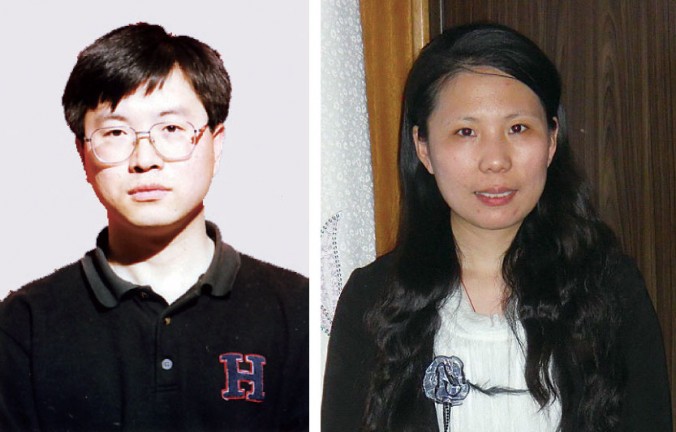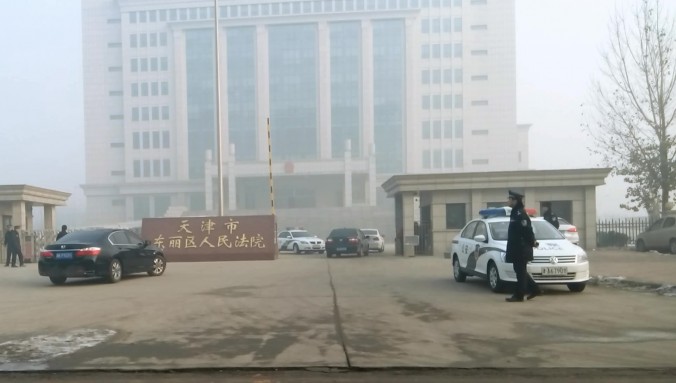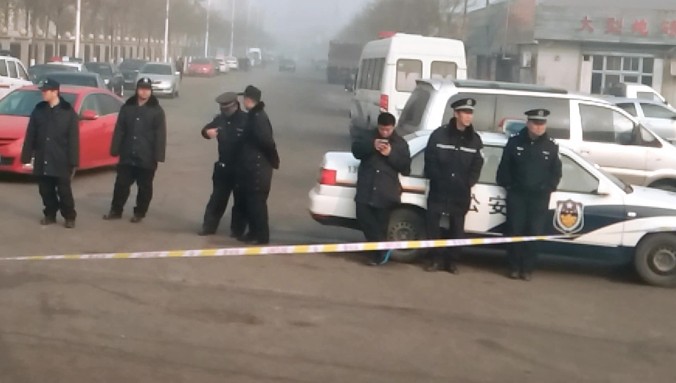
For Persecuted Chinese Couple, Injustices Continue in Court
[Photo Caption: Falun Gong practitioner couple Zhou Xiangyang and Li Shanshan in an undated photo. (Minghui.org)]
By Larry Ong, Epoch Times | December 23, 2015


A Chinese husband and wife whose experience of separation and persecution has extended nearly a decade were hauled into a courtroom again recently. Once again, they faced a kangaroo court and highly politicized charges.
The romantic and tragic saga of the couple—who were married while the man, Zhou Xiangyang, was in a detention center—has been documented by Amnesty International and other human rights organizations. After their marriage in 2009, Zhou and Li Shanshan, his wife, have only been able to meet for brief snatches of time before one or the other of them is again taken away by police and detained.
On Nov. 30, the two were together again, in the Tianjin Dongli District Court. They were accused of having “undermined the law” by practicing Falun Gong, a traditional discipline of self-cultivation, which includes exercises and the moral teachings of truthfulness, compassion, and tolerance, and for raising awareness about the persecution of the practice.
A tale of tragedy and romance in China yet to have its happy ending.
Since July 1999 Falun Gong has been marked for elimination by the Chinese Communist Party, after a decision to launch a nationwide campaign by former Party leader Jiang Zemin.
Zhou and Li had been held in a detention center in the eastern Chinese city of Tianjin since March, after police raided their home and arrested them for possessing Falun Gong material, according to Minghui.org, a clearinghouse for information about the persecution of Falun Gong. Such material typically includes the Falun Gong teachings and fliers and CD-ROMs about the abuses of those who practice it in China.
As is typical in similar cases, where the court system is used to enforce a political decision, the trial was marked by irregularities.
The defendants, for instance, were absent legal counsel, after one of their lawyers was prevented from arriving due to heavy smog, and the other resigned in protest at the judge’s peremptory decision not to suspend the trial because of the absence of his colleague.
Zhou and Li were also unable to defend themselves, forced to respond only with a “yes” or a “no” to the hectoring questions of the judge. The judge, Zhang Yaling, was also observed wearing a telephone headpiece, raising the question of whether he was receiving instructions from a third party.
Judge Zhang concluded the trial in 30 minutes, after the couple’s cellphones containing Falun Gong information were held up as evidence. The verdict has not been released yet; Chinese courts typically pass sentence within two months, though an appeal, lodged by lawyer Li Zhongwei on Dec. 22, is now in process, which may delay or alter the conclusion of the case.
Saga of Separation
The love story of Zhou Xiangyang and Li Shanshan’s is the stuff of a tragic drama, or perhaps a live example of the Chinese folktale in which a pair of star-crossed lovers are permitted by heaven to only meet once a year.
The Tianjin couple had met only briefly, on three occasions, before Zhou was arrested by police for telling others about Falun Gong in May 2003. He was sentenced to prison for nine years, beginning in August 2004. Speaking about the persecution of Falun Gong publicly, or handing out information regarding the Chinese regime’s violent abuses of practitioners, may be considered criminal offenses in China and punished with either jail time or years in a forced labor camp.
Having learned about Zhou’s detention through his family and friends—Zhou was verbally abused, beaten unconscious, and shocked with electric batons in a forced labor camp—Li grew to sympathize and admire him.
I felt that this world was colder than the winter itself.
In the winter of 2004, she decided to visit Zhou at Tianjin’s Gangbei Prison. However, after spending an hour on a bus and walking half an hour in heavy snowfall to get there, she was rebuffed at the gates by prison guards. Only relatives were allowed in, they said.
Sitting outside the gates and staring at the empty, reed-strewn property around the prison, Li grew despondent.
“I felt that this world was colder than the winter itself. Xiangyang just wanted to live by truthfulness, compassion, and tolerance. He did not commit any crime,” Li wrote in an account on Minghui.org, a Falun Gong website.
On the spur of the moment, Li asked the prison officers to marry the two of them. Her request startled them: usually, the only marriage-related requests received by such men were requests for divorce from spouses whose families had been shattered by the Party’s ceaseless campaign of persecution. They finally relented and let her see him as her fiancé—after she persisted in her request for five months.
The couple were finally married in October 2009, two months after Zhou was released from detention on medical parole.
Like the lovers in the Chinese folktale, however, they weren’t together for long.
In March 2011, they were again detained by the authorities. Because the two were well-liked by local residents, and their story had been passed around locally, over 7,000 Chinese signed a petition demanding the couple’s release. This is an unusual feat given the relentless campaign of vilification carried out by the Party’s propaganda organs since the beginning of the anti-Falun Gong campaign.
The efforts of the couple’s parents were also moving. Zhou Xiangyang’s father, a burly man from the countryside, would walk around with a white smock upon which he had written the tale of his son’s persecution. In 2012, the parents drove a tractor to the prison compound, on which they had hung banners of protest, and passed three cold nights under it, until security forces arrested them and put the elderly couple in a re-education center.
In December 2011, Amnesty International released an urgent appeal calling for the release of Zhou Xiangyang and Li Shanshan, and the persecution of the couple became known internationally.
The couple found freedom in 2012—until this past March. Whether they will be separated again will be decided by Judge Zhang, who shouted at them to be silent last month when they attempted to defend themselves in Tianjin’s Dongli District Court.


